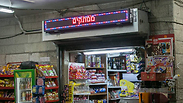
Let's start with the facts. The claim that Israelis embark on shopping sprees on Saturdays is baseless. Trade volumes on Saturday (excluding Saturday evening, which I will address later) are only marginal.
The flow of people to the shopping centers outside the cities which are open on Shabbat stopped years ago. It happened for many reasons - from the growing traditionalism in the Jewish society to the decision to keep the most popular chains closed on Shabbat. The number of malls which are open on Shabbat in the Jewish sector can be counted on the fingers of two hands - and even in those malls, half of the businesses are closed.
And so another argument made by the bill's initiators, that on Saturday there is allegedly "an unfair competition against the small grocery store", is baseless too. There are hardly any small grocery stores left in Israel today. They have been replaced by the kiosks, which are open on Shabbat, and by several non-kosher chains which operate on the day of rest, mostly in the format of convenience stores.

In other words, the current Shabbat arrangements actually hurt the large chains, which are pushing - indirectly of course - for the legislation of universal religious coercion laws. For their own sake.
Add that to the actual shopping issue. Most Israelis who shop on Shabbat are hardworking people who work from 8 am to 8 pm throughout the week. The convenience stores which are open on Shabbat actually serve the weak middle class - but charge exaggerated prices, because of the limited competition.
The law's clear religious nature is also evident from its definition of Shabbat: The ban on opening stores will not apply from midnight Friday to midnight Saturday, but from the beginning of Shabbat till the end of Shabbat according to the Halacha. Why? The massive opening of malls and commercial chains on Saturday evening deals the most serious blow to small businesses. They stand to lose the most.
And finally, the religious aspect. It has been proven that the Jewish public observes tradition when it comes to matters which the State does not intervene in, and rebels against tradition when a certain behavior is imposed.
For example, there is no law requiring Israel's residents to install a mezuzah, circumcise their sons or avoid driving on Yom Kippur - yet nearly all Israeli Jews choose to do so at their own free will. On the other hand, the ban on public transportation on Shabbat has led to a public desecration of Shabbat. Closing commerce on Shabbat will lead to a similar result: A mass flow of Israeli Jews to shopping centers in the non-Jewish sector.
The current bill banning commerce on Shabbat is totalitarian in its scope, unfair in its wording and anti-social in its outcome. It doesn’t serve Jewish tradition, but rather the large commercial chains and the public activists of the ultra-Orthodox parties, which are a main part of the coalition.

















